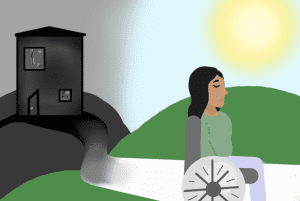Indian Insurers Are Denying Health Cover For Intellectual, Developmental Disabilities
Despite clear guidelines, insurance companies in India exclude those with intellectual and developmental disabilities from coverage

Insurance companies in India routinely deny coverage to or reject claims of individuals living with intellectual and developmental disabilities, shows a Behanbox investigation. This is despite laws and regulations that seek to ensure this support.
In February 2020, Om, then 10 years old, was diagnosed with pneumonia after 10 days of consistently high fever and chest congestion. The Bengaluru teen, who is under Autism Spectrum Disorder (ASD), was hospitalised with the family assured that the cost of treatment would be covered under the Care Health (formerly Religare) Family Floater Insurance plan.
However, a representative of the insurance company showed up at the hospital and insisted that his mother Geetha VM, an entrepreneur, sign a declaration stating that Om is under ASD along with specifying the age at which it was diagnosed. Though Geetha insisted that it was only “suspected” autism – the psychometric assessment from a government hospital had mentioned “mild developmental delay with academic and learning difficulty” – she was coerced into giving the declaration, she says.
“Subsequently, we received a mail from the insurance company which stated that Om’s ‘policy was subject to cancellation owing to non-disclosure of material facts with regards to pre-existing ailments’,” Geetha told BehanBox. “My husband and I were shocked because we were never asked any questions about intellectual disabilities or neurodivergence at the time of buying the insurance policy. Nor did the agent mention the conditions excluded from the policy.”
Numerous mails to Care Health Insurance specifying that being under ASD had no bearing on Om’s physical illness and that her son’s condition was never flagged by the company during the annual health checks did not elicit a helpful response. “Nothing helped. Om’s policy was cancelled. We had to pay the hospital bills,” she said.
“If we mention the child’s diagnosis at the time of taking a new health policy, they reject it. If we do not reveal the condition while buying the policy, they reject any claims made for the child and remove their name from the policy. What are we supposed to do?” Geetha asks.
Since then Geetha has written to several leading insurance companies including Max Niva Bupa, Acko General Insurance, and Care Health Insurance but has failed to find a comprehensive family health policy that would provide medical coverage for Om. “Most companies say that their underwriters are still evaluating the possibility of offering a cover, or that they are in the process of devising a policy,” Geetha told BehanBox.
“There may not be enough data or clinical experience of long term risks to design the product appropriately”, wrote a senior manager of Care Health Insurance to Geetha. “When inclusion of Covid-19, a viral illness hitherto unheard of, was done expeditiously when directed by the Insurance Regulatory and Development Authority of India (IRDAI), did the insurance companies not lack the data and clinical experience for it?”, asked Geetha.
Parents of children living with Down’s Syndrome had similar complaints.
What are the Insurance Regulatory and Development Authority of India’s rules on the coverage of neurodevelopmental and genetic disorders? According to its 2019 guidelines, these disorders cannot be excluded from health insurance policies.
However, a BehanBox investigation involving over a dozen families, children and experts across four cities, and at least five leading insurance carriers, has revealed that insurance firms violate these regulations by denying coverage or rejecting claims of individuals living with these conditions.
Insurance companies in India often categorise autism as a chronic disease and not the neurodevelopmental disorder that it is. It is also excluded from health insurance coverage because insurance policies do not cover pre-existing illnesses or conditions, said Himani Narula, a developmental paediatrician and co-founder of Continua Kids, an early intervention support centre for children with special needs.
“However if a child under ASD develops pneumonitis or meningitis and needs hospitalisation, then a previous diagnosis of autism has no correlation with the acute illness which can also be found commonly in any child, including a typically developing child,” Narula said.
BehanBox has sought a response on these allegations from insurance companies featured in the article and will update it accordingly.
What the law and government policies say
Autism and Down’s Syndrome are both recognised as intellectual disabilities under the Rights of Persons with Disabilities Act, 2016, which directs the central and state governments to devise schemes that provide comprehensive insurance schemes for persons living with disability.
The only government scheme that offers a comprehensive insurance cover for individuals living with intellectual disabilities is the Niramaya Health Insurance Scheme formulated under the National Trust Act, 1999. It provides an annual ‘reimbursement only’ insurance cover of up Rs 1 lakh including coverage for hospitalisation, outpatient department charges, ongoing therapies and transportation costs to individuals possessing valid disability certificates.
“Till 2021, the only private insurance companies to offer medical insurance to individuals living with autism were Star Health and Allied Insurance and Care Health Insurance – each with its own set of limitations including long waiting periods and age limits for the insured,” Thanapal Sivakumar, professor at the National Institute of Mental Health and Neurosciences (NIMHANS) in Bengaluru told BehanBox.
A comprehensive insurance cover for children with special needs, including those living with Down’s and autism, was launched in February 2022 by Care Health Insurance in collaboration with Mom’s Belief, a parenting platform. It claims to cover hospitalisation, therapies and OPD costs incurred for pre-existing conditions through cashless benefits and settling reimbursement claims. However, the scheme is only available to customers of the Mom’s Belief platform.
In November 2022, SBI General Insurance issued a group health policy to the Nutan Gulgule Foundation, non-profit voluntary organisation that works for the disabled, for individuals with Down’s syndrome with an insurance coverage of Rs 3-5 lakh for any hospitalisations during the policy period.
The Bajaj Allianz Women-Specific Critical Illness insurance plan offers a congenital disease benefit, which includes Down’s Syndrome, to the insured women. A child born with one of the listed congenital disabilities and who survives past 30 days of birth will be entitled to 50% of the sum insured. But the benefit is applicable to only the first two children born to a mother, whose age is less than 40 years.
Despite repeated directions from the IRDAI to underwrite and formulate insurance policies (see here and here) for persons with disabilities, insurance companies have failed to follow through.
While insurance companies raised the premiums by 40%-70% for most health covers in 2020 to expand their coverage to persons with disabilities following IRDAI’s orders, the new policies have hardly been formulated or introduced in the market, we found.
In 2018, the Delhi High Court directed the regulatory body to review the exclusionary clauses in insurance contracts and ensure that insurance companies did not reject claims on the basis of genetic disorders. The order was delivered as part of the judgement in United India Insurance versus Jai Parkash Tayal, wherein the plaintiff’s claim was rejected because he had Hypertrophic Obstructive Cardiomyopathy, a genetic order, which was listed as an exclusion by the said insurance carrier. However, the court concluded by saying that the right to avail health insurance is an integral part of the right to healthcare and the right to health, as recognised under Article 21 of the Constitution which guarantees right to life and personal liberty. It also noted that the ‘exclusionary clause of `genetic disorders’, in the insurance policy, is too broad, ambiguous and discriminatory – hence violative of Article 14 of the Constitution of India’
Following the order, IRDAI barred insurers from rejecting claims based on genetic disorders.
Illegal rejections
Sayani Deo*, a dance teacher in Bengaluru, was told in 2021 that her five-month-old daughter who has Down’s Syndrome would need to undergo an open heart surgery which would cost them Rs 8,00,000. Since they could not afford to pay for the procedure otherwise, they purchased an insurance top-up ahead of the surgery to ensure that the entire cost of the treatment could be covered.
The insurance company, IFFCO-Tokio, granted an approval when the treatment plan and estimate were submitted by the hospital. However, the claim was rejected at the time of discharge because the summary prepared by the hospital mentioned that Deo’s daughter had Down’s Syndrome.
“It broke us completely. The hospital bill was too high and they refused to let us go until the bill was settled. Since the insurance company never told us about the exclusion of Down’s, we had not anticipated a rejection. Rs 8 lakh is a huge amount for middle class people like us. Even if we managed to pay the bill somehow, we would not have been able to send our other daughter to school,” said Deo.
Deo threatened legal action and persistently called the third-party administrator as well as the insurance company in question. Eventually the bill was settled. However, Deo did not hold the company accountable or tried clarifying whether her daughter’s medical expenses would be covered under the policy in the future fearing retribution impacting her daughter’s access to health insurance.
Insurance companies avoid denying policies to families of children who have a genetic or neurodevelopmental disorder through formal modes of communication, suggests anecdotal evidence. For example, Gayathri Nair*, a banker whose 12-year-old son is under Autism Spectrum Disorder, wrote to multiple insurance companies to purchase a policy cover for her family. “While some companies did not respond, others reached out to me telephonically to refuse the inclusion of her son in the family cover. When I asked them to formally communicate this over email, they stopped responding to her calls and emails.”
Nair eventually purchased a family floater policy without disclosing her son’s condition.
Similarly, when Sara Vaz, a south Goa based librarian, contacted Star Health and Allied Insurance to buy a comprehensive health cover for her family, including her 14-year-old son Alber, she was denied the policy telephonically and told that she should purchase the Star Special Cover, which only offers an annual cover of Rs 3,00,000.
“It was only after repeated mails that they conveyed the same over mail. My son has frequent seizure episodes, has limited speech and requires speech therapy in addition to occupational and behavioural therapies. Given his condition, a health insurance policy is imperative. We bought the Star Special Cover but we still spend Rs 30,000 on an average every month on my son’s medication and therapy,” Vaz told BehanBox.
Since children living with autism and Down’s Syndrome can have multiple comorbidities, their parents always anticipate medical or financial contingencies.
Cost of therapy
Shashikala Ramalingam’s daughter Simran (22), who lives with Down’s Syndrome, was born with a ventricular septal defect (a hole in her heart) and required an open-heart surgery as is often the case with children who have the condition. “At the time I was covered under the Employees’ State Insurance Scheme. I got the money for the surgery through the scheme even though my daughter had Down’s,” said Ramalingam. “However, I am no longer covered under the scheme and have not found a single policy in all these years that would provide insurance cover for her. As a result, I have to put my entire salary in my daughter’s bank account as a contingency fund and the household expenditures are managed by my husband.”
Children on the autism spectrum or with developmental disorders need early interventions – speech, occupational and behavioural therapies for instance – because these are the only scientifically established lines of treatment, says paediatrician Narula. The child can only be treated through acquisition of skills which is done through a varied range of therapies. The earlier these therapies are started, the better is the developmental outcome and often reduces the burden of the disability,” explains Narula.
On an average these therapies could cost anywhere between Rs 15,000 to Rs 20,000 per month, said Susithra, who prefers using her first name. Her 18-year-old son who is autistic had a weak jaw and required extensive speech therapy in his childhood. “In addition to therapies, medication to manage his comorbidities and schooling, these children also require special education. Further, schools demand that we appoint shadow teachers for our children out of our own pockets. On an average, I spend approximately Rs 50,000 to Rs 60,000 per month to ensure that my son is able to lead a healthy life,” she told BehanBox.
Since autism is a lifelong disability, it is even more important for our children to have access to comprehensive insurance schemes which can cover the therapy costs too. The only government insurance scheme that includes coverage of therapies is the Niramaya scheme. However, the annual coverage for therapies is capped at Rs 10,000 under it.
Star Special Care claims to cover behavioural therapy, physiotherapy, occupational therapy, and speech therapy on an OPD basis. However, this is capped at Rs 1,500 per policy period or per annum, nowhere close to what families actually end up paying for therapies, pointed out social entrepreneur Deepa Garwa whose daughter lives with Down’s Syndrome.
Public versus private insurance
The treatment for children of government employees living with autism or Down’s syndrome is covered under the Central Government Health Scheme and others under ESI. However it is not easy to access benefits under these schemes either, claims Garwa.
“Since my husband is a central government employee, my daughter has access to the CGHS. But the process to avail financial support under the scheme is long-drawn and tedious and subject to the approval of the doctors at the government dispensaries. Until these doctors refer or suggest a line of treatment, we cannot get the reimbursement. So far I have only availed the benefits under the scheme for my daughter’s open-heart surgery,” said Garwa.
*Names changed on request to protect identities
We believe everyone deserves equal access to accurate news. Support from our readers enables us to keep our journalism open and free for everyone, all over the world.




